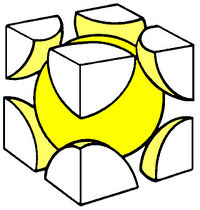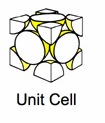Difference between revisions of "TF EIM Chapt3"
Jump to navigation
Jump to search
| Line 14: | Line 14: | ||
{| border="3" cellpadding="20" cellspacing="0" | {| border="3" cellpadding="20" cellspacing="0" | ||
| − | | [[File:TF_EIM_BodyCentereCubic.jpeg| 200 px]] || [[File:TF_EIM_FaceCentereCubic.jpeg| 200 px]] | + | | [[File:TF_EIM_SimpleCubic.jpeg| 200 px]] || [[File:TF_EIM_BodyCentereCubic.jpeg| 200 px]] || [[File:TF_EIM_FaceCentereCubic.jpeg| 200 px]] |
|- | |- | ||
| − | |(BCC) Body Centered Cubic|| (FCC) Face Centered Cubic | + | |(SC) Simple Cubic || (BCC) Body Centered Cubic|| (FCC) Face Centered Cubic |
|- | |- | ||
|} | |} | ||
Revision as of 04:20, 15 February 2011
Semiconductor physics
There are 5 states of matter: Solid, liquid, gas, plasma (ionized gas) , and a Bose-Einstein condensate (quantum effects on a macroscopic scale).
Crystal Lattice
Semiconductor physics focuses on the solid state of matter in the form of crystals.
Crystals are formed when atoms are arranged in repeating structures called the crystal lattice. The recurrent structure which forms the crystal lattice is referred to a a cell.
Some popular cell names are
 |
 |

|
| (SC) Simple Cubic | (BCC) Body Centered Cubic | (FCC) Face Centered Cubic |
There are 14 different Bravais lattice configurations
| Crystal System | Lattice type |
| Cubic | Simple, Face Centered, Body Centered |
| Tetragonal | Simple, Body Centered |
| Orthorhombic | Simple, Face Centered, Body Centered, End Centered |
| Monoclinic | Simple, End Centered |
| Rhombohedral | Simple |
| Triclinic | Simple |
| Hexagonal | Simple |